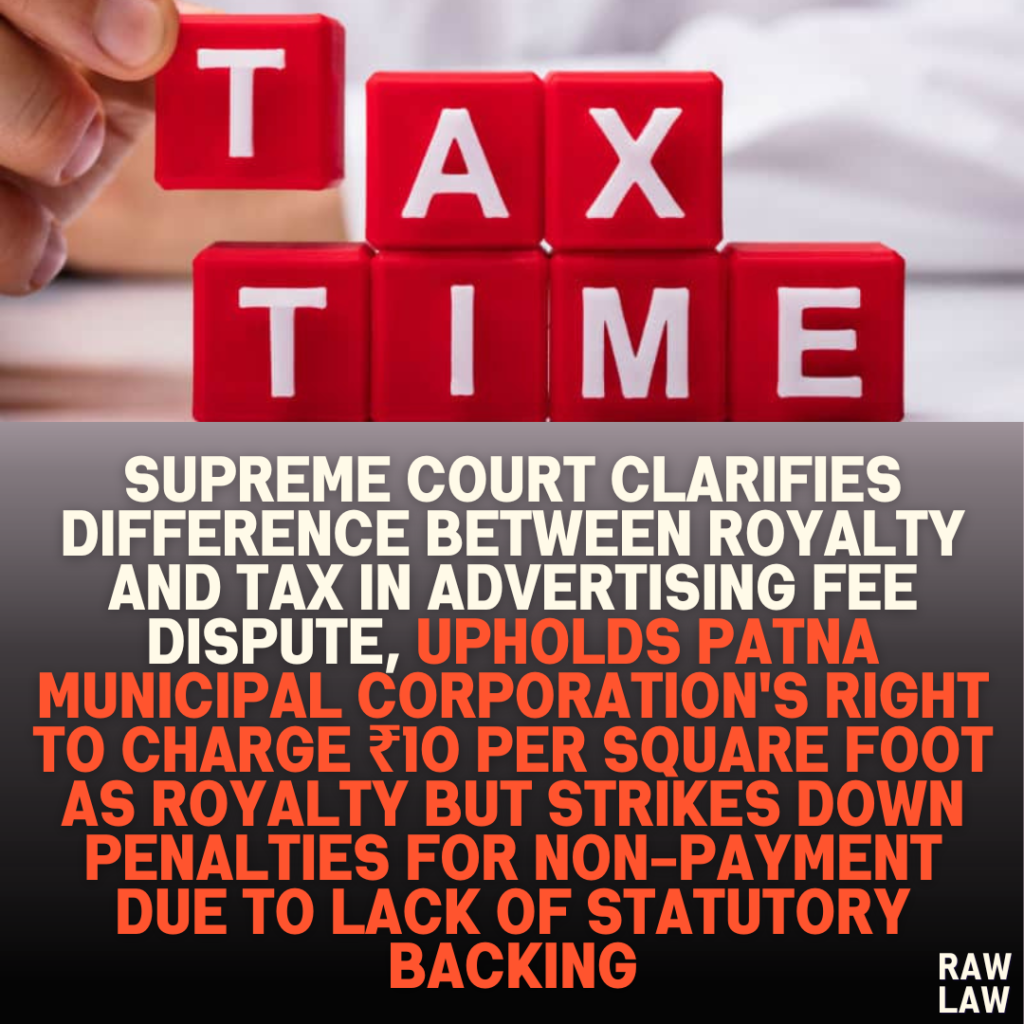Court’s Decision:
The Supreme Court ruled in favor of the Patna Municipal Corporation, allowing it to charge a royalty of ₹10 per square foot for advertisements displayed within its jurisdiction. However, the Court held that the Corporation could not impose penalties for non-payment of this royalty in the absence of legislative backing. The decision clarified that the levy was a “royalty” and not a “tax,” as there was no statutory provision for imposing a tax on advertisements at the relevant time.
Facts:
The Patna Municipal Corporation sought to charge advertising agencies a royalty of ₹10 per square foot per annum for hoardings displayed within its jurisdiction. Initially, in 2005, a rate of ₹1 per square foot was agreed upon between the Corporation and the advertisers. This rate was increased to ₹10 per square foot in 2007, which led to disputes when advertisers refused to comply with the new rate, leading to penalties imposed by the Corporation. The advertisers challenged this enhancement and penalties in the Patna High Court.
The High Court quashed the demand for royalty, stating that there was no legislative sanction, and directed the Corporation to refund the amounts collected. The Corporation appealed the decision to the Supreme Court.
Issues:
- Whether the demand for ₹10 per square foot as royalty could be equated with a tax.
- Whether the Patna Municipal Corporation had the authority to impose penalties for non-payment without statutory backing.
Petitioner’s Arguments:
The Patna Municipal Corporation argued that the demand was a royalty, not a tax, as it was based on an agreement with advertisers. They asserted that royalty is distinct from tax and does not require legislative backing, being a payment for the privilege of using the Corporation’s land for advertisements.
Respondent’s Arguments:
The advertising agencies contended that the enhanced royalty rate and the penalties imposed by the Corporation were without legislative sanction. They argued that the royalty effectively functioned as a tax, which cannot be levied without statutory authority. They further challenged the penalties imposed for non-compliance, stating that the Corporation lacked the legal authority to do so.
Analysis of the Law:
The Court reviewed the legal distinction between royalty and tax. It emphasized that royalty is a payment for a benefit or privilege, often established through an agreement between parties. In contrast, a tax is a compulsory exaction under statutory power without the consent of the payer. The Court ruled that the demand for ₹10 per square foot was indeed a royalty and not a tax.
Precedent Analysis:
The Court referred to several previous judgments, including Indsil Hydro Power and Manganese Limited v. State of Kerala and Century Spinning and Manufacturing Co. Ltd. v. Ulhasnagar Municipal Council, which confirmed the distinction between royalty and tax. The Court also noted the decision in State of W.B. v. Kesoram Industries Ltd., which held that royalty is not a tax.
Court’s Reasoning:
The Court reasoned that the Corporation’s demand for royalty was based on an agreement between the parties and did not require legislative sanction as would be the case for a tax. The Court noted that the advertisers had acquiesced to the royalty charge and paid it for several years, thereby precluding them from challenging its legality later. However, the imposition of penalties for non-payment was deemed unlawful, as no statutory provision permitted such action by the Corporation.
Conclusion:
The Supreme Court upheld the Corporation’s right to charge ₹10 per square foot as royalty but struck down the penalties imposed for non-payment, as they lacked statutory backing. The Court also directed the Corporation to charge interest on delayed payments instead of penalties.
Implications:
This judgment reinforces the legal distinction between royalty and tax, emphasizing that while royalty can be charged based on agreements, taxes require statutory authority. It also restricts municipal corporations from imposing penalties without legislative support.



